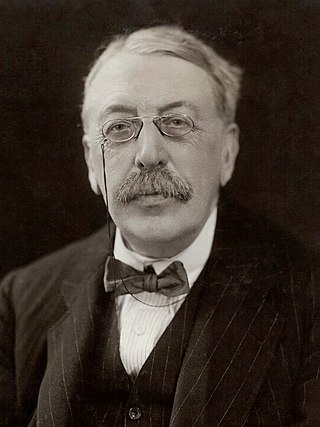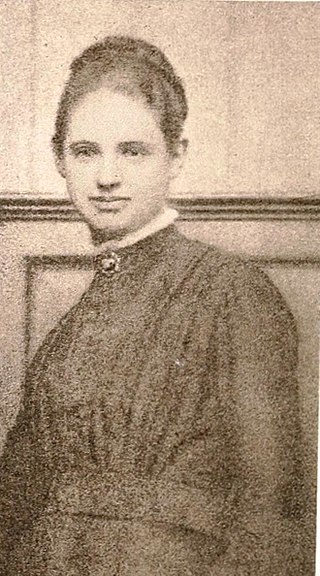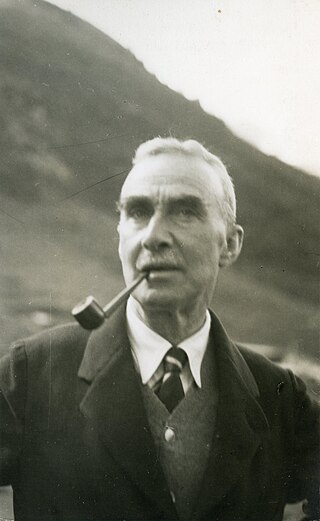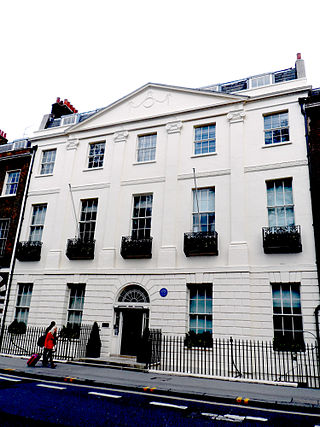Related Research Articles

Sir Edward William Elgar, 1st Baronet, was an English composer, many of whose works have entered the British and international classical concert repertoire. Among his best-known compositions are orchestral works including the Enigma Variations, the Pomp and Circumstance Marches, concertos for violin and cello, and two symphonies. He also composed choral works, including The Dream of Gerontius, chamber music and songs. He was appointed Master of the King's Musick in 1924.
This is a list of notable events in music that took place in the year 1903.

Sir Charles Villiers Stanford was an Anglo-Irish composer, music teacher, and conductor of the late Romantic era. Born to a well-off and highly musical family in Dublin, Stanford was educated at the University of Cambridge before studying music in Leipzig and Berlin. He was instrumental in raising the status of the Cambridge University Musical Society, attracting international stars to perform with it.

Mary Elizabeth Coleridge was a British novelist and poet who also wrote essays and reviews. She wrote poetry under the pseudonym Anodos. Other influences on her were Richard Watson Dixon and Christina Rossetti. Robert Bridges, the Poet Laureate, described her poems as 'wonderously beautiful… but mystical rather and enigmatic'.

Classical music of the United Kingdom is taken in this article to mean classical music in the sense elsewhere defined, of formally composed and written music of chamber, concert and church type as distinct from popular, traditional, or folk music. The term in this sense emerged in the early 19th century, not long after the United Kingdom of Great Britain and Ireland came into existence in 1801. Composed music in these islands can be traced in musical notation back to the 13th century, with earlier origins. It has never existed in isolation from European music, but has often developed in distinctively insular ways within an international framework. Inheriting the European classical forms of the 18th century, patronage and the academy and university establishment of musical performance and training in the United Kingdom during the 19th century saw a great expansion. Similar developments occurred in the other expanding states of Europe and their empires. Within this international growth the traditions of composition and performance centred in the United Kingdom, including the various cultural strands drawn from its different provinces, have continued to evolve in distinctive ways through the work of many famous composers.

Sir John Frederick Bridge was an English organist, composer, teacher and writer.

Cyril Bradley Rootham was an English composer, educator and organist. His work at Cambridge University made him an influential figure in English music life. A Fellow of St John's College, where he was also organist, Rootham ran the Cambridge University Musical Society, whose innovative concert programming helped form English musical tastes of the time. One of his students was the younger composer Arthur Bliss, who valued his tuition in orchestration. Rootham's own compositions include two symphonies and several smaller orchestral pieces, an opera, chamber music, and many choral settings. Among his solo songs are some settings of verses by Siegfried Sassoon which were made in co-operation with the poet.

August Johannes Jaeger was an Anglo-German music publisher, who developed a close friendship with the English composer Edward Elgar. He offered advice and help to Elgar and is immortalised in the Enigma Variations.

Frederic William Austin was an English baritone singer, a musical teacher and composer in the period 1905–30. He is best remembered for his restoration and production of The Beggar's Opera by John Gay and Johann Christoph Pepusch, its sequel, Polly, in 1920–23, and for his popularization of the melody of the carol The Twelve Days of Christmas. Austin was the older brother of the composer Ernest Austin (1874–1947).
The Stratton String Quartet was a well-known British musical ensemble active during the 1930s and 1940s. They were specially associated with the performance of British music, of which they gave numerous premieres, and were a prominent feature in the wartime calendar of concerts at the National Gallery. After the War the group was re-founded as the Aeolian Quartet.

John Alexander Fuller Maitland was an influential British music critic and scholar from the 1880s to the 1920s. He encouraged the rediscovery of English music of the 16th and 17th centuries, particularly Henry Purcell's music and English virginal music. He also propounded the notion of an English Musical Renaissance in the second half of the 19th century, particularly praising Charles Villiers Stanford and Hubert Parry.

The Song of Hiawatha, Op. 30, is a trilogy of cantatas written by Samuel Coleridge-Taylor between 1898 and 1900. The first part, Hiawatha's Wedding Feast, was particularly famous for many years and made the composer's name known throughout the world.

Julius Buths was a German pianist, conductor and minor composer. He was particularly notable in his early championing of the works of Edward Elgar in Germany. He conducted the continental European premieres of both the Enigma Variations and The Dream of Gerontius. He also had notable associations with Frederick Delius and Gustav Mahler.

The Oxford and Cambridge Musical Club was founded in London in 1899 as a residential Club for Gentlemen. At the club's foundation, it was open (principally) to past and present members of the Universities of Oxford and Cambridge. The club's original purpose was the performance of chamber music but expanded over the years to include solo instrumental music, vocal music, orchestral music and opera. Its first premises were at 47 Leicester Square but from 1914 to 1940 the club was situated at 6 Bedford Square. Ladies were first admitted in 1938. After 1940 the club ceased to be a residential club.
This is a summary of 1934 in music in the United Kingdom.
This is a summary of 1930 in music in the United Kingdom.
This is a summary of 1912 in music in the United Kingdom.
This is a summary of 1904 in music in the United Kingdom.
This is a summary of 1901 in music in the United Kingdom.
References
- ↑ "Cyril Scott". Cyril Scott. Retrieved 22 January 2019.
- ↑ Matthew Riley (5 July 2017). British Music and Modernism, 1895-1960. Taylor & Francis. p. 41. ISBN 978-1-351-57301-6.
- ↑ Moore, Jerrold N. (1984). Edward Elgar: a Creative Life. Oxford: Oxford University Press. p. 323. ISBN 0-19-315447-1.
- ↑ Philip L Scowcroft. "A Yorkshire Musician - Arthur Wood". MusicWebInternational. Retrieved 14 January 2019.
- ↑ Barker, Duncan J. "Mackenzie, Sir Alexander Campbell", Grove Music Online (requires subscription), accessed 27 September 2009
- ↑ Dinah Birch; Margaret Drabble (24 September 2009). The Oxford Companion to English Literature. OUP Oxford. p. 909. ISBN 978-0-19-280687-1.
- ↑ "Arthur Seymour Sullivan, 1842-1900 / by Henry Saxe Wyndham". National Library of Australia catalogue. Retrieved 15 January 2019.
- ↑ "Little yellow bird [music] / written & composed by C.W. Murphy & Wm. Hargreaves". National Library of Australia. Retrieved 13 January 2019.
- ↑ Parker, Bernard S. World War I Sheet Music: 9,670 Patriotic Songs Published in the United States, 1914-1920, with More Than 600 Covers Illustrated. Jefferson, N.C.: McFarland, 2007. ISBN 9780786424931 OCLC 71790113
- ↑ Stephen Kingsbury. "The Apostles, oratorio for soloists, choruses & orchestra, Op. 49". AllMusic. Retrieved 13 January 2019.
- ↑ "The Late Dr. Joseph Parry". The Wilkes-Barre Record. 19 December 1903. p. 19 – via Newspapers.com.

- ↑ "A Princess of Kensington". The Edward German Discography. Retrieved 13 January 2019.
- ↑ "The School Girl a Hit". The New York Times, 10 May 1903, accessed 13 January 2019
- ↑ The Stage , 17 Dec 1903, p. 13 – Original cast list.
- ↑ "UK's oldest person, Gladys Hooper, dies aged 113". BBC News. Retrieved 21 January 2019.
- ↑ Slominsky, Nicolas; Kuhn, Laura Diane, eds. (2001). "Milford, Robin (Humphrey)". Baker's Biographical Dictionary of Musicians (Centennial ed.). New York: Schirmer Books . Retrieved 2018-02-28– via Encyclopedia.com.
- ↑ "Avril Coleridge-Taylor", Oxford Dictionary of National Biography; retrieved 26 Jan 2015
- ↑ "Lennox Berkeley timeline". Lennox Berkeley Society. Retrieved 13 January 2019.
- ↑ Grove’s Dictionary of Music and Musicians, 5th Edition, E.B., 1954, page 887.
- ↑ Dennis Taylor, Eric Ball: His Life and Music, 1903-1989, Cambridge Scholars Publishing, 2012, p.3
- ↑ "Death of Dr. Joseph Parry". The Cambrian News and Merionethshire Standard. 20 February 1903. p. 6. Retrieved 31 May 2016.
- ↑ Who Was Who 1897-1916 gives her date of death as 30 June; the Musical Times obituary gives 28 June
- ↑ Field, Christopher D. S. "Oakeley, Sir Herbert Stanley (1830–1903)". Oxford Dictionary of National Biography (online ed.). Oxford University Press. doi:10.1093/ref:odnb/35273.(Subscription or UK public library membership required.)